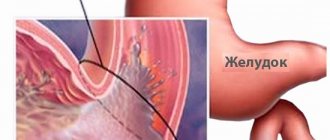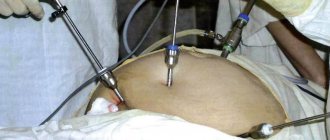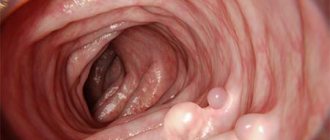Unpleasant sensations in the abdominal area can be caused by eating habits and certain habits. At the initial stage, they do not provoke the development of organic pathology and bring only some discomfort.
But when the body’s adaptive capabilities are exhausted, the tissues undergo changes and an inflammatory process begins in them. Abdominal pain and unpleasant belching can be the result of overeating or a late dinner, but if the factors that cause them act systematically, this can lead to diseases of the gastrointestinal tract.
What is burping
Belching in adults is the process of the return of gases and liquid contents from the lower parts of the gastrointestinal tract into the oral cavity.
In general, it is believed that this phenomenon is of physiological origin, but in some cases it can indicate diseases of the digestive system, diaphragm, cardiopathy, and neurotic conditions. Usually gas from the stomach comes out in small portions unnoticed through the mouth or intestines. With excessive swallowing of air or increased formation of gas in the stomach, intragastric pressure increases, contraction of the stomach muscles occurs, simultaneous relaxation of the lower esophageal sphincter (located between the stomach and esophagus) and compression of the sphincter between the stomach and duodenum (pyloric sphincter), which causes belching.
In healthy people, belching is rare, mainly due to air entering the stomach during hasty eating, “on the go,” drinking carbonated drinks, eating dry food, eating very fresh bread, cabbage, peas, and beans. In these cases, physical activity can provoke belching. Belching can be air, food, bitter, sour, rotten, as well as loud and quiet. Belching with air usually has no smell or taste and occurs when air is swallowed (aerophagia) or increased formation of gas in the stomach, says doctor Olga Smirnova .
Signs of bloating
Symptoms in the digestive system
Flatulence disrupts the functioning of the entire digestive system. Gases accumulated in the intestines prevent the normal movement of food, which causes heartburn, belching, and an unpleasant taste in the mouth. In addition, gases during bloating lead to an increase in the lumen of the intestine, to which it reacts with stabbing or aching pain, often occurring in the form of contractions. The release of gases relieves discomfort for a while, but only until their next “portion” accumulates and causes another cycle. This condition may be accompanied by bowel dysfunction (constipation or diarrhea), nausea and decreased or complete absence of appetite.
Manifestations in children
In newborns and infants, flatulence manifests itself quite clearly. The child becomes irritable and capricious and often wakes up. Appetite worsens, bloating increases after eating. During feeding, the baby may greedily grab the nipple or breast, but immediately release it. Frequent regurgitation of both milk or formula and air may occur.
to come back to the beginning
Causes of air belching in adults
The causes of air belching can be physiological and pathological.
Physiological reasons . In this case, air escapes from the esophagus and stomach periodically and is caused by the physiological state of the person.
- A person swallows excess air while eating, for example, this happens when a person is in a hurry, talks while eating, or overeats.
- Also, belching of odorless air can occur due to beans, peas, cabbage, baked goods and other foods that cause increased gas formation.
- Exercising immediately after eating can also cause air belching in an adult.
- While smoking, a person also swallows air, which then leads to an unpleasant symptom.
- Uncontrolled consumption of fruits. The fact is that their acids, when mixed with other substances, can cause belching of air.
- Taking a bath after eating. Because of this, blood flow increases in the legs, and in the stomach, on the contrary, decreases. This leads to digestive problems, including abdominal pain and belching.
Now let's talk about pathological reasons .
- Severe stress. Neurotic causes can cause an unpleasant symptom that will be constantly repeated.
- Stomach diseases. This applies to gastritis, peptic ulcers, and esophageal stenosis.
- Inflammatory processes in the esophagus.
- Liver problems.
- Cardiovascular diseases.
Treatment of aerophagia
To get rid of aerophagia, you need to cure the underlying disease. If the illness is neurotic in nature, you should seek advice from a psychotherapist, maybe even a psychiatrist. The patient should not swallow saliva, but should spit it out. You have to eat very slowly. Talking while eating is prohibited. Drinks with carbon dioxide are completely excluded from the diet. Gymnastics are carried out regularly, time for sports and other active activities increases.
Can dysbiosis lead to aerophagia? What is dysbacteriosis, watch the video:
Symptoms of air belching in adults
If belching is repeated regularly, has a sour taste, and bloating occurs, then this indicates serious problems with the upper gastrointestinal tract.
Symptoms of belching air, indicating pathology.
- Rotten belching indicates a putrefactive process in the stomach, which develops when the food eaten the day before stagnates in it. It happens with gastritis with low acidity, malignant tumors.
- Sour belching indicates gastritis, high acidity, which precedes gastric ulcers and duodenal ulcers.
- Bitter belching indicates that bile is being thrown into the stomach cavity, which cannot normally happen. It happens with a functional disorder such as reflux and cholecystitis.
- Odorless belching indicates poor diet, addiction to soda and chewing gum.
Diseases that cause air to escape from the stomach
In some diseases, belching of air is the only symptom, such as in gastric neurosis (aerophagia). But more often it occurs against the background of gastrointestinal pathologies, and also appears reflexively in diseases of the liver and gall bladder.
Bitter belching occurs as a result of bile entering the stomach from the duodenum. The putrid smell of gas is felt if rotting and fermentation begins in the stomach. This happens if food stagnates due to poor gastrointestinal motility.
Sour belching is caused by an increased concentration of hydrochloric acid or fermentation, which occurs when there is a lack of acidic contents in the gastric juice. The release of gas with a sour odor often occurs when the gastric mucosa is inflamed due to an increased concentration of hydrochloric acid, as well as due to peptic ulcers.
Causes of stomach pain after eating
In addition to belching, patients complain of severe stomach pain, heartburn that occurs after eating, and frequent constipation.
With a peptic ulcer, belching often appears on an empty stomach, especially if there was a late dinner. Treatment of the disease involves taking medications that block acid production and reduce the acidity of gastric juice (antacids).
The release of air from the gastrointestinal tract with a rotten odor is typical when food is retained in the stomach, because it is not able to digest it due to a lack of secretion or due to impaired peristalsis. This happens with chronic gastritis with low acidity.
Often it is belching that is the first sign of exacerbation of a chronic disease. Symptoms of the pathology also include heaviness and aching pain in the area of the xiphoid process, nausea, regurgitation, a feeling of excessive fullness of the stomach after eating, and diarrhea. On palpation, patients may experience moderate pain in the pit of the stomach.
A person belches rotten with pyloric stenosis. When the disease occurs, food stagnates in the stomach because obstruction of the pyloric region has developed. During normal functioning, the sphincter must ensure the passage of the bolus of food into the duodenum and prevent it from being thrown back.
As a rule, the release of air from the stomach occurs in diseases of the biliary tract and pancreas
If the activity of the pylorus is impaired, then the digestive function also deteriorates, since pancreatic juice penetrates from the intestines and the acidic environment changes to alkaline. Pyloric stenosis is caused by peptic ulcer disease.
The ulcer located in the pyloric part of the stomach becomes scarred, which causes deformation of the affected area and narrowing of the canal, as a result of which the evacuation of food is complicated or stopped. In addition to rotten belching, the pathology causes vomiting, heaviness in the abdomen for a couple of hours after eating, and heartburn.
With a diaphragmatic hernia, stomach pain and belching of air often occur. This is due to the fact that air enters the stomach through the hole. The disease is also characterized by bloating, heartburn, and chest pain due to compression of the organs located in the hernial sac.
Esophagitis is diagnosed if the lining of the esophagus is affected, making it difficult for food to pass into the stomach. The disease is characterized by the release of air from the food eaten, a constant sour taste in the mouth, nausea, and pain along the esophagus.
Rotting in the stomach begins only if there is no hydrochloric acid in the gastric juice (achlorhydria) or there is a deficiency of both hydrochloric acid and the enzyme pepsin (achylia).
If duodeno-gastric reflux has developed, in which intestinal contents are refluxed into the stomach, then the belching has a bitter taste, which is due to the presence of bile. If there is no reflux, then belching occurs reflexively and is odorless.
Most often, belching and pain occur with inflammatory pathology of the biliary tract, which is not associated with the presence of stones. In case of pathology, a dull aching pain in the abdomen or a feeling of heaviness in the right side under the ribs, right shoulder blade, in the pit of the stomach is disturbing, as well as nausea, flatulence, and an increase in body temperature.
Symptoms are mainly observed after eating certain foods (fried, spicy, smoked, fatty). When palpating the abdomen, pain is felt in the hypochondrium on the right. If calculous (stone) cholecystitis develops against the background of non-calculous cholecystitis, then odorless belching is replaced by belching with a bitter aftertaste.
When the disease worsens, extremely painful biliary colic appears due to spasm of the gallbladder walls.
Since pancreatic enzymes do not enter the duodenum during pancreatitis, this affects the retention of food in the stomach, where fermentation processes and the release of hydrogen sulfide begin. Therefore, there is pain in the lower abdomen, belching with the smell of rotten eggs.
With exacerbation of pancreatitis, severe abdominal pain and frequent belching are felt, which can even provoke vomiting of bile
Belching sour and pain in the stomach can also be one of the signs of a neoplasm in the gastrointestinal tract. Symptoms of the disease depend on the location of the tumor and its size. As a rule, there is pain in the sternum, heartburn, bloating, nausea, vomiting with blood or feces, impaired swallowing, and lack of appetite.
Treatment of air belching in adults
If belching is accompanied by pain, nausea, an unpleasant odor and occurs regularly, this means that you need to immediately consult a doctor to clarify the diagnosis.
After examining and obtaining data on the state of the gastrointestinal tract, the doctor will prescribe a diet and medication.
Treatment of air belching is carried out strictly according to the doctor’s recommendations. He can prescribe anti-inflammatory drugs, drugs to improve the functioning of the digestive tract, prescribe diet and physical therapy. Surgeries are prescribed only for cancer, hernia and other serious cases.
Diagnostics
Diagnosis of air belching occurs in several stages. First, the doctor will talk with the patient, then prescribe tests and additional laboratory and instrumental research methods. These include:
- general blood test, general urinalysis;
- blood test and glucose level determination;
- determining the level of electrolytes in the blood;
- detection of antibodies to the bacterium Helicobacter pylori in the blood.
Another way to diagnose the acidity of the stomach contents is to conduct intraesophageal pH measurements. If cholecystitis and duodenitis are suspected, an ultrasound is prescribed, which makes it possible to determine the nature of the disease and the degree of functional disorder.
This is interesting
Bloating in adults: how to deal with it
Modern methods of treatment
- Diet therapy. A person with air belching in his diet should exclude foods that stimulate or, conversely, slow down the secretion of enzymes. This includes: smoked meat and fish, fried, spicy foods, sour dressings and sauces, fast food.
- Taking enzyme preparations. It is prescribed if the belching is not caused by pathology and is short-term in nature. Only a doctor prescribes medications.
- Prescription of drugs that normalize the level of hydrochloric acid in the body. These include Almagel, Gastal, Rennie. In addition, they have an analgesic and enveloping effect.
A doctor can prescribe medicine for air belching only after all the necessary tests have been carried out and a diagnosis has been established. Self-medication can cause irreparable harm to health.
show more
How to deal with bloating?
Eliminating flatulence is a complex process. Treatment is developed and applied after identifying the causes of bloating and may include the following measures to eliminate the source of the problem and alleviate the symptoms of this condition.
Lifestyle correction
Bloating after eating is often caused by poor food hygiene. A calm environment during breakfast and lunch, leisurely chewing of food, exclusion of carbonated drinks and chewing gum from the diet, quitting smoking - these measures will help prevent air from entering the stomach.
Popular questions and answers
Gastroenterologist Olga Smirnova will answer popular questions .
What are the causes of burping air?
● Diet violations: carbonated drinks, large amounts of food, snacks on the go. ● Dietary features, reaction to foods - beans, beans, cabbage, peas, etc. ● Obesity, pregnancy, constipation: intra-abdominal pressure increases. ● Physical activity after meals. ● Diseases of the gastrointestinal tract: hiatal hernia, gastritis/duodenitis, gastroesophageal reflux disease, gastric or duodenal ulcer, pancreatitis, hepatitis, cholecystitis, colitis and more. ● Taking certain medications (relaxes the sphincter between the esophagus and stomach): nitrates, theophylline, some calcium channel blockers.
Does burping air always indicate gastrointestinal diseases?
If belching is rare, does not cause discomfort and does not change the quality of life, then there is no reason to worry. Normally, belching can occur during overeating, during physical activity after eating, or during fast eating. Constant burping of air can be a sign of various diseases. Belching can occur reflexively in diseases of the abdominal organs, for example, the liver, gall bladder, as well as in cardiovascular diseases (coronary heart disease, myocardial infarction, etc.). But most often, belching occurs due to diseases of the stomach and duodenum.
Symptoms of the disease
It is known that the appearance of belching is influenced by many diseases of the stomach and intestines. They, in turn, are characterized by specific symptoms that can occur in parallel with belching.
- Gastroesophageal reflux pathology: this is the most common cause of complaints of belching. Reflux-associated symptoms appear during changes in body position and in addition to belching, include: chest pain, nausea and vomiting, rapid saturation of the stomach, cough, shortness of breath. The development of this condition is preceded by the following factors: overeating, smoking, use of medications, sedentary lifestyle. This disease can trigger the development of ulcers or erosion of the esophagus.
- Gastritis: characterized by inflammatory processes in the gastric mucosa. Signs of pathology are not only belching, but also: nausea, pain, bouts of vomiting, heaviness in the stomach. If gastritis has an atrophic form, putrid belching appears against the background of rapid satiety, the skin becomes pale, and the nails become brittle. With non-atrophic gastritis, sour belching occurs.
- Stomach ulcer: in addition to belching, it is manifested by pain, nausea, constipation and refusal to eat. Very similar to the symptoms of gastritis, so you need to be extremely careful during diagnosis.
- Stomach cancer: this is a progressive and rapidly developing pathology, the symptoms of which are similar to gastritis. Main symptoms: poor appetite, rapid satiety, sudden weight loss, heaviness in the epigastric region.
- Pathology of the esophagus: diseases of this part of the digestive organs provoke the appearance of belching. Signs of esophageal pathology are: a feeling of a lump in the throat, difficulty swallowing, chest pain, sudden weight loss, heartburn. If the disease develops, inflammatory processes and progressive irreversible changes will appear, causing significant discomfort while eating.
- Subgastric belching: A form of belching in which air does not reach the stomach and exits the esophagus. A person can control and call it independently. When a patient complains about this reaction of the body, it should be assumed that he does not control his actions and needs the help of a psychotherapist.
Diagnostics
Any symptom requires examination to make an accurate diagnosis. Since belching is not an independent disease, it is necessary to treat the source that led to the occurrence of the unpleasant symptom. Making a diagnosis and prescribing adequate treatment occurs only after the necessary examination and testing:
- You need to take a blood test. It is mandatory to take blood for biochemical analysis and for detailed analysis.
- An ultrasound scan of all organs responsible for digesting food is performed, and the intestinal tract is examined.
- Gastroscopy.
Having received the answers and diagnostic results, the doctor prescribes a course of treatment and diet.
Key points
Belching is not a disease, but only a symptom. In a healthy person, it can appear when swallowing a large amount of air, overeating, or stressful situations. Eructation is a sign not only of digestive disorders, but also of diseases of the nervous system.
Belching is often observed with gastritis, peptic ulcer, reflux esophagitis, pancreatitis, duodenitis. If erection is accompanied by additional symptoms, you should immediately go to a specialist. Treatment should be aimed primarily at eliminating the underlying pathology.
Folk remedies for belching
Tea with mint is a folk method of combating belching. Quite simple methods of control will help improve the digestion process, get rid of unpleasant belching, and will also have a beneficial effect on the processes of the gastrointestinal tract. You can brew aromatic tea with the addition of lemon balm or mint. It will help get rid of rotting processes and is good for spasms. You can prepare one plant separately, steam it with boiling water and let it brew, or you can add it to regular tea leaves.
You can also prepare a tincture with centaury. When preparing, follow the proportions: 1 tbsp. spoon of herb per 1 glass of water. But it is important to stick to the dosage, 1 tablespoon 3 times a day. Calamus root helps a lot.
It can be taken in powder form - 1/3 teaspoon in dry form. This will help not only with belching, but also with heartburn. Also, calamus root is useful to add to tea and make an infusion. It improves the digestive process, has a good effect on the mucous membranes and protects against gas formation and the process of rotting.
Chamomile is irreplaceable and useful, which can be used as an additive to regular tea or purchased chamomile in dosed bags and brewed separately. It will help with inflammatory processes of the mucous membrane, protect against rotting processes, food stagnation, and also has a bactericidal effect.
Raspberries and blackberries have a good effect on digestive processes, which can be used as a supplement or separately as an infusion. Don't forget about the health benefits of soups and broths. You should add liquid food to your daily diet, which will improve the digestion process, reduce gas formation and stimulate the production of bile.










